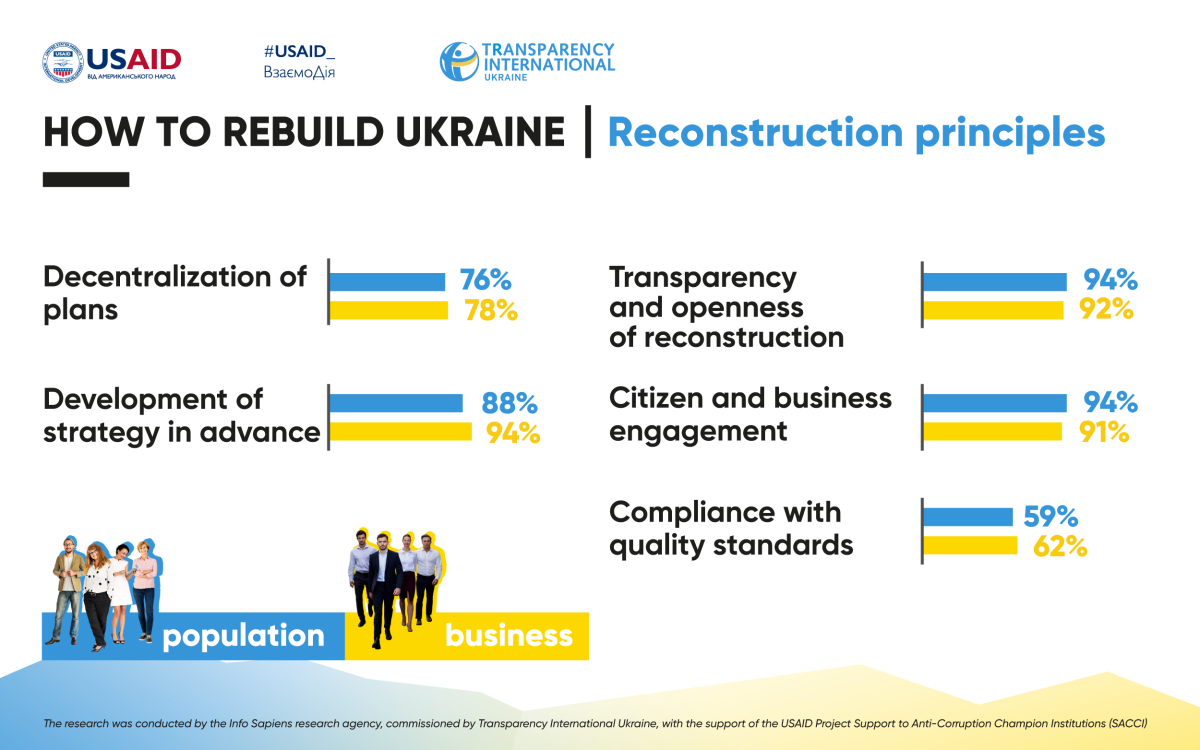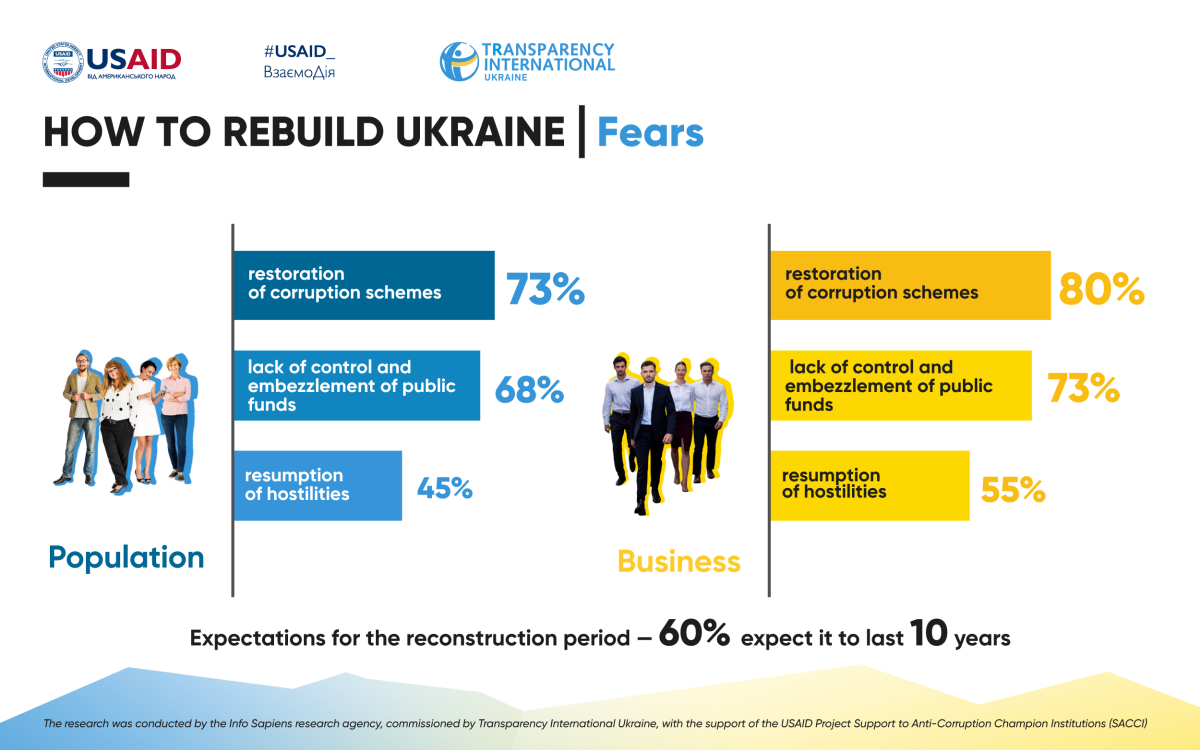

At the request of Transparency International Ukraine with the support of the USAID ‘Support to Anti-Corruption Champion Institutions’ (SACCI) Program in Ukraine, Info Sapiens research agency conducted a sociological survey among the population and representatives of Ukrainian business about the needs and expectations of the future reconstruction of Ukraine. These data represent the opinion of citizens and businesses on the main issues: expectations from reconstruction, vision for the restoration, trust in the institutions, the main risks and ways to offset them.
The main problems of Ukraine in the opinion of Ukrainians and business
Ukrainians consider the war (98%), the destruction of infrastructure and housing (87%), as well as corruption (77%), to be the main problems of the country. The next most serious issues are the lack of professional specialists in power (61%) and unemployment (60%); the latter is perceived especially acutely by women (probably, they experience this problem more often). Among other important problems of Ukrainians are the high cost of living and low incomes.
And if the population places corruption third after the armed aggression of russia and its consequences, then for business the issues of corruption seem more serious than destruction. Business representatives complain significantly more often about corruption, lack of professionalism of the authorities, the injustice of the judicial system and are concerned about population migration and the lack of investment in the economy.
The business identifies the lack of solvent demand, low purchasing power, loss of qualified personnel, problems with the supply chain, and loss of logistics links as its main pain points for today. The shortage of qualified personnel is particularly acute in such areas as Design, Construction, Professional and Technical Activities and Transport and Logistics.
83% of business representatives suffered losses. 25% suffered destruction or damage, but only a third of them recorded or are recording damage to file a claim for compensation. They do not apply for compensation because they do not believe in reimbursement and/or assistance, the business does not see the point of submitting such applications.
Expectations of the population and the business from the reconstruction process
The population and the business share the position that the reconstruction of Ukraine will last up to 10 years or more — this opinion was expressed by 60% of business representatives and the population.
The main principles of reconstruction in the opinion of the vast majority of respondents should be:
- Decentralization of funds. Each affected community has its features, so the plans should be individual. 76% of Ukrainians and 78% of business representatives agreed with this opinion. Accordingly, 50% of Ukrainians and 68% of business representatives believe budgets should also be allocated for each project, and not distributed centrally.
- Development of reconstruction strategy in advance. Ukraine should develop plans and reconstruction strategies now, so as not to waste time after the victory. 86% of Ukrainians and 81% of business representatives agreed with this opinion.
- Transparency and openness of reconstruction. 79% of the population and 62% of business representatives believe that all processes and stages of the country’s recovery should be as transparent and open as possible, for example, using the Prozorro system. Respondents are also interested in access to data on responsible individuals, results of control over work performance, control of receipts and expenditures of funds.
- Citizen and business engagement. Respondents insist that in the process of reconstruction, the authorities should consult the public and the business — this desire is demonstrated by 94% of the population and 91% of entrepreneurs.
- Quality of work as a priority. The population clearly supports the idea that the selection of performers of reconstruction works should be based on the principle of “better longer/more expensive, but better.” More than half of the respondents name high quality of work, reputation (good reviews), and experience in project implementation among the main criteria. At least one of these criteria was mentioned by 93% of respondents. The business fully supports the population in the desire to rely on reputational criteria in the selection of performers of reconstruction works, as well as on factors of experience and proven quality. To be more precise, the propensity to rely on reputation criteria among business representatives is significantly higher than among the population (71%-73% among the businesses compared to 56% among the population).
“Ukrainian society pays an extremely high price, fighting for its freedom. Thus, the population demonstrates its growing demand for the future, while declaring its readiness to actively engage in processes and be part of changes. On the one hand, Ukrainians want to get a “magic wand” and build everything better than it was, with strategic planning and comprehensive solutions. On the other hand, they understand the importance of rebuilding housing and infrastructure wherever possible and the relevance of these works today,” said Anastasia Mazurok, Deputy Executive Director of Transparency International Ukraine.
Reconstruction priorities
Both the population (59%) and business representatives (63%) are convinced that housing for those who lost it should be built now, and not wait for major construction after the victory. At the same time, respondents believe that the priority should be to restore the critical infrastructure of the country, and houses come second.
The population expects that the reconstruction will affect not only the destroyed objects and areas, but will also cover the construction of what the country needed before the war and the modernization of old objects. For example: villagers expect that as part of the reconstruction, roads and social infrastructure (hospitals, schools) in their area will be built / repaired.
Fears regarding future reconstruction
The results of the survey show that in matters of rebuilding the country, Ukrainians, especially business representatives, consider corruption an even greater threat than a possible repetition of hostilities. Thus, 73% of Ukrainians and 80% of business representatives are most concerned about the resumption of corruption schemes in the reconstruction process. 63% of citizens and 73% of entrepreneurs are afraid of the lack of control and the embezzlement of public funds as a result. The resumption of hostilities only comes third, according to the business (45%) and the population (55%).
To neutralize the main fear of Ukrainians — corruption, it is necessary to provide control mechanisms — this is the opinion of 33% of the population and 44% of business representatives. Moreover, Ukrainians are in favor of increasing criminal liability for corruption (24% and 18%, respectively).
The population as a whole has a rather vague idea of which institutions should be responsible for certain areas in reconstruction.
- For example, the relative majority of respondents (from 42% to 46%) consider business structures (both national and international) to be responsible for finding financing, the authorities come second (in particular, the President and international donor organizations).
- According to more than half of the population, the business (local, national, and international), as well international organizations and donors, should finance the reconstruction.
- Almost all institutions have to control expenditures — from the authorities at all levels to public activists and law enforcement agencies. However, when clarifying, the main responsibility for control is assigned to independent auditors and the President.
- According to 44% of Ukrainians, the President of Ukraine has to set the tasks, while 30% believe this should be done by local, legislative, and central executive authorities.
- Local authorities (54%) and the President (49%) have to control the implementation of tasks.
What is important, the State Agency for Restoration and Infrastructure Development of Ukraine, which has been established only this year, will be effective in the opinion of 65% of the population. The rate of expectation of efficiency among businesses is significantly lower and is 49%.
“The business, like the population of Ukraine, is afraid of corruption and the restoration of practices that lack integrity. At the same time, the business generally trusts the authorities less and relies more on itself.
The results of the study emphasize the critical importance of ensuring transparent access to information, comprehensive communication, explanation of plans, and how citizens can influence certain stages of reconstruction and be engaged in different stages. This is the key to understanding and avoiding disappointments,” says Anastasiia Mazurok, Deputy Executive Director of Transparency International Ukraine.
*This research was made possible by the support of the American people through the United States Agency for International Development (USAID) within the SACCI project. The content of this publication is the sole responsibility of Transparency International Ukraine and does not necessarily reflect the views of USAID or the United States Government.
For reference: The Support to Anti-Corruption Champion Institutions Program in Ukraine (SACCI) is a seven-year initiative of the United States Agency for International Development (USAID), which aims to assist Ukraine to combat corruption and increase accountability and transparency of governance in Ukraine. The program seeks to empower key government institutions to fight corruption, build public support for and engagement in anti-corruption efforts, reduce citizen tolerance to corruption, as well as ensure maximum transparency and accountability of Ukraine’s post-war reconstruction and









